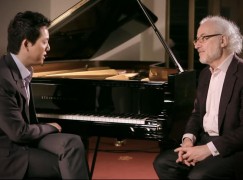How to make peace between Lang Lang and Yundi
mainIn a programme-length interview on Shanghai’s main television channel, I was asked about the acrid rivalry that persists between China’s two best-known classical musicians.
I offered a remedy which (I hope) you can watch below.
You may also find the programme’s production values interesting and encouraging.
And the adverts are culturally illuminating.
If the embed below doesn’t work click here to see the programme.






Comments